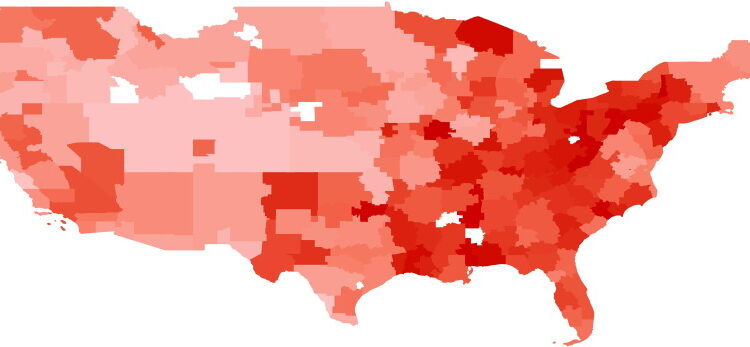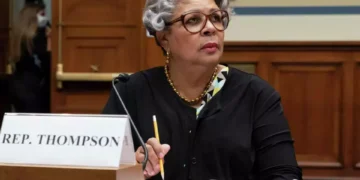Image Source: Science Direct
July 11, 2024 Story by: Editor
Introduction
Does racial animus significantly impact a black candidate’s vote share in modern America? Current research is inconclusive: “Despite considerable effort by numerous researchers over several decades, there is still no widely accepted answer as to whether or not prejudice against blacks remains a potent factor within American politics” (Huddy and Feldman, 2009).
Understanding the Significance of Racial Animus
This question interests scholars for two main reasons: understanding contemporary prejudice and comprehending voting determinants. However, it’s challenging to answer due to individuals’ reluctance to admit socially unacceptable attitudes, such as racial prejudice, in surveys (Tourangeau and Ting, 2007; Berinsky, 1999, 2002; Gilens et al., 1998; Kuklinski et al., 1997).
Methodology: A New Approach
This paper employs a non-survey-based methodology, using a previously untapped data source to study prejudice. I propose using the percentage of Google search queries containing racially charged language as a proxy for an area’s racial animus. I then compare this proxy to Barack Obama’s vote shares, adjusting for John Kerry’s presidential vote share.
The Reliability of Google Data
Google data are unlikely to be significantly censored socially: searchers are often alone and online, making it easier to express taboo thoughts (Kreuter et al., 2009). People are notably candid with Google (Conti and Sobiesk, 2007), as indicated by the high number of searches for pornography and sensitive health information. Aggregating millions of searches, Google can reveal meaningful social patterns. For example, the percentage of searches including the word “God” explains more than 60% of area-level variation in belief in God.
Defining Racially Charged Searches
I define an area’s racially charged search rate as the percentage of Google searches, from 2004 to 2007, that included the word “[Word 1]” or “Word 1.” I chose the most salient word to limit data-mining. I excluded data post-2007 to avoid reverse causation, where dislike for Obama could lead to increased use of racially charged language on Google.
The epithet “Word 1” was frequently searched on Google between 2004 and 2007, on par with terms like “migraine(s),” “economist,” “sweater,” “Daily Show,” and “Lakers.” Common searches included phrases like “[Word 1] jokes” and “I hate Word 1,” often leading to websites with derogatory material about African Americans. The highest search rates were in West Virginia, upstate New York, rural Illinois, eastern Ohio, southern Mississippi, western Pennsylvania, and southern Oklahoma.
Findings: Impact on Obama’s Vote Share
The racially charged search rate significantly and negatively predicted Obama’s 2008 and 2012 vote shares, controlling for Kerry’s 2004 vote share. This result held even when controlling for changes in unemployment rates, home-state candidate preference, Census division fixed effects, demographic controls, and long-term Democratic voting trends. The effect was slightly larger when adding controls for an area’s Google search rates for other moderately correlated terms, but this does not indicate racial animus. I also controlled for search rates for terms like “African American,” “[Word 2],” (the alternate spelling common in rap songs), and profane language.
Alternative Explanations
A non-racial explanation might be that areas with higher racially charged search rates became less likely to support Democratic candidates generally during this period. However, this is not supported by the evidence. There is no significant relationship between an area’s racially charged search rate and changes in House Democratic vote shares or measured liberalism over the same period. Additionally, polling data suggest that neither Hillary Clinton nor John Edwards would have faced similar disadvantages in areas with high racially charged search rates had either been the 2008 nominee instead of Obama.
Quantifying the Impact
The preferred estimates suggest that, compared to the most racially tolerant areas in the U.S., prejudice cost Obama 4.2 percentage points of the national popular vote in 2008 and 4.0 points in 2012. This implies that 9.1% (2008) and 9.5% (2012) of white voters who would have supported a white Democratic candidate did not support Obama.
Gains from Racial Identity
Obama lost more votes due to racial animus than he gained from his race. Calculations suggest that Obama gained at most one percentage point of the popular vote from increased African-American support. This effect was limited by African-Americans comprising less than 13% of the population and already overwhelmingly supporting Democratic candidates. Evidence from other research, and new analysis in this paper, suggest that few white voters switched to support Obama in the 2008 or 2012 elections due to his race.
Contribution to Literature
This paper contributes to the extensive literature reviewed by Huddy and Feldman (2009) on the effects of racial attitudes on black candidates. The Google-based methodology shows significantly larger effects of racial attitudes on Obama than survey-based estimates (Mas and Moretti, 2009; Piston, 2010; Pasek et al., 2010; Schaffner, 2011; Lewis-Beck et al., 2010; Kinder and Dale-Riddle, 2012; Tesler and Sears, 2010a). Section 4.1 argues that this methodology provides a more robust test of the causal effect of racial animus compared to other studies.
Broader Implications
Furthermore, the new proxy for area-level prejudice may be useful for research in social economics (Alesina et al., 2001; Alesina and La Ferrara, 2002), labor economics (Charles and Guryan, 2008), and urban economics (Cutler et al., 1999; Card et al., 2008).
Overall, this paper supports a significant role for Google data in the social sciences. Previous studies using Google data have noted correlations with other data (Ginsberg et al., 2009; Seifter et al., 2010; Varian and Choi, 2010; Scheitle, 2011). This paper demonstrates that Google search query data can do more than correlate with existing measures; on sensitive topics, they can provide better data and open new research avenues. If Google data offers the best evidence on such a well-studied question, it may also provide the best evidence on many other important questions. Source: Science Direct
















